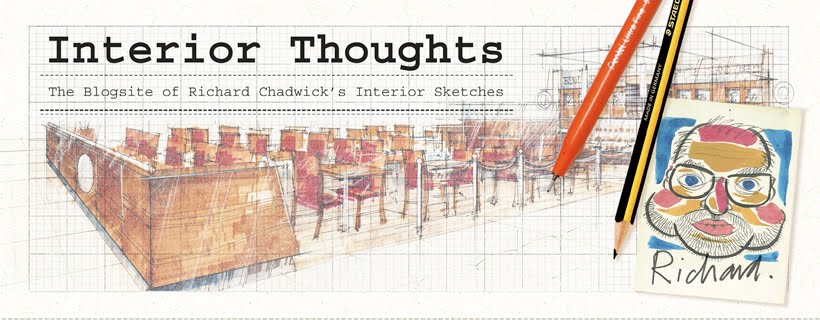November 11th - Armistice Day... not quite the day perhaps to be thinking of end-of-the-pier shows and the English music hall. This is, however, precisely how the film 'Oh What a Lovely War' is presented, an interpretation of the Great War as it turns from carnival to tragedy, the greatest loss of life in a single conflict that this country has ever experienced. Rarely shown on T.V. it has only been made available on DVD for the last three years or so... although, much to my surprise, there are now a number of clips on YouTube.
The producer Joan Littlewood's left wing credentials were never in doubt; a member in the 1930's of the communist party and an associate of Ewan MColl, she was central to the establishment of the Theatre Workshop in the late forties ( the foundation of modern theatre in the UK) and apart from her collaboration with Cedric Price on the 'Fun Palace' in the early sixties, went on to produce stage productions of 'A Taste of Honey' and - more importantly here - 'Oh What a Lovely War', filmed in the late sixties with Richard Attenborough as director.
I have no idea what today's - or even yesterday's - generation would make of the film, in a culture where war and ersatz violence seem to be the mainstay of the burgeoning gaming industry; a charming period piece? I can only see it in social context... I was at art college in the late 60's, and the film seems to me to capture perfectly the zeitgeist of the times; the swinging sixties, the explosion of pop-art (particularly via its exponent of 'Englishness' - Peter Blake) the growth of satire and an irreverence for authority, all set against the rise of the CND movement, the rumblings of Vietnam from across the water, and the continuing cold-war stand-off between the US and Russia. The music hall / end of the pier settings for the initial jubilation certainly act as a counterpoint to the final scenes, increasing the feeling of waste and despair as the cameras pan back and back to reveal the increasing enormity and futility of it all. I have never really seen any other film like it; very much of its time, yet managing to show its subject matter in an absurdist light that few other anti-war films manage to achieve. An almost exact contemporary though , is the following clip of Country Joe and ' Fixin to Die Rag '- filmed within a few months of the release of ' Oh What a lovely war ', certainly in the same year - 1969. The immediacy of Vietnam is again dealt with with the same joyous sense of absurdity - the bouncing ball says it all. Music Hall as protest.
The last word should remain with the film however - it finally leaves us with one of the most enduring images, signs, symbols of the 20th century; not a sign of peace but - more importantly - a sign of remembrance... " for those who cannot remember the past are condemned to repeat it "

The producer Joan Littlewood's left wing credentials were never in doubt; a member in the 1930's of the communist party and an associate of Ewan MColl, she was central to the establishment of the Theatre Workshop in the late forties ( the foundation of modern theatre in the UK) and apart from her collaboration with Cedric Price on the 'Fun Palace' in the early sixties, went on to produce stage productions of 'A Taste of Honey' and - more importantly here - 'Oh What a Lovely War', filmed in the late sixties with Richard Attenborough as director.
I have no idea what today's - or even yesterday's - generation would make of the film, in a culture where war and ersatz violence seem to be the mainstay of the burgeoning gaming industry; a charming period piece? I can only see it in social context... I was at art college in the late 60's, and the film seems to me to capture perfectly the zeitgeist of the times; the swinging sixties, the explosion of pop-art (particularly via its exponent of 'Englishness' - Peter Blake) the growth of satire and an irreverence for authority, all set against the rise of the CND movement, the rumblings of Vietnam from across the water, and the continuing cold-war stand-off between the US and Russia. The music hall / end of the pier settings for the initial jubilation certainly act as a counterpoint to the final scenes, increasing the feeling of waste and despair as the cameras pan back and back to reveal the increasing enormity and futility of it all. I have never really seen any other film like it; very much of its time, yet managing to show its subject matter in an absurdist light that few other anti-war films manage to achieve. An almost exact contemporary though , is the following clip of Country Joe and ' Fixin to Die Rag '- filmed within a few months of the release of ' Oh What a lovely war ', certainly in the same year - 1969. The immediacy of Vietnam is again dealt with with the same joyous sense of absurdity - the bouncing ball says it all. Music Hall as protest.
The last word should remain with the film however - it finally leaves us with one of the most enduring images, signs, symbols of the 20th century; not a sign of peace but - more importantly - a sign of remembrance... " for those who cannot remember the past are condemned to repeat it "


No comments:
Post a Comment